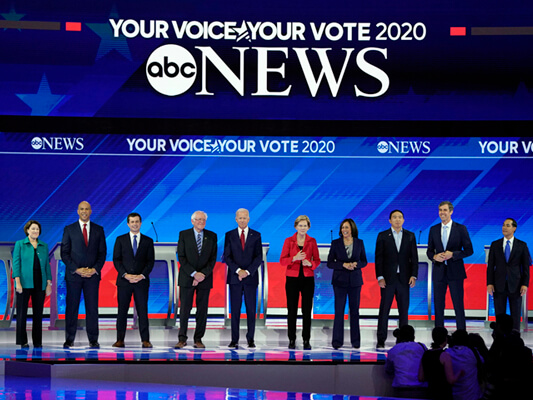Democratic presidential candidates on stage in Houston, September 12 (from left): Amy Klobuchar, Cory Booker, Pete Buttigieg, Bernie Sanders, Joe Biden, Elizabeth Warren, Kamala Harris, Andrew Yang, Beto O’Rourke, and Julian Castro
With the “primary season” well under way, candidates for the Democratic presidential nomination met for a televised debate September 12 in Houston, Texas. The nearly three-hour event was the third in a series planned by the Democratic National Committee (DNC). It featured 10 candidates who had reached polling and fundraising benchmarks set by the DNC. It was the first debate where the three leading candidates—former vice president Joe Biden, Senator Bernie Sanders of Vermont, and Senator Elizabeth Warren of Massachusetts—were on the stage together. They were joined by Senator Kamala Harris of California; Pete Buttigieg, mayor of South Bend, Indiana; Senator Cory Booker of New Jersey; Senator Amy Klobuchar of Minnesota; Robert “Beto” O’Rourke, former Texas congressman; Julian Castro, former mayor of San Antonio; and businessman Andrew Yang.
Polls taken after the debate seem to show that not much changed in voters’ minds. Biden remains the front-runner, followed by Warren and Sanders. Of the rest, none have double-digit support in the newest polls. The difficulty of standing out in such a crowded debate format probably hurts the lesser-known candidates the most. Many of the Democrats’ policy proposals are similar, so they hope to have a big moment on national TV. One candidate who didn’t make it to this latest round in the debates likened the DNC’s process to “The Hunger Games.” The Democratic primary race started off with more than two dozen candidates, some of whom already dropped out because they didn’t make it to this debate. To qualify, each candidate had to show at least 2 percent support in four recent polls and receive financial support from 130,000 or more individual donors spread across at least 20 states.
The next debate will be held October 15–16 in Westerville, Ohio. Actual primary voting won’t begin until early next year, with the Iowa Caucuses on February 3, the New Hampshire Primary on February 11, and contests in South Carolina and Nevada later in the month. Election day itself is more than a year away: Tuesday, November 3, 2020. Primaries are state-by-state elections in which candidates compete to win the nomination of a political party. Democrats run against Democrats, and Republicans against Republicans. President Donald Trump, who is seeking reelection, is not expected to face much of a challenge in the Republican primaries.
Image credit: © David J. Phillip/AP Images
Related Links:
- Democratic Presidential Primary Debate (September 12, 2019)
Background and data about the September 12debate; includes link to YouTube video and transcript and summaries of each candidate’s performance.
(Source: Ballotpedia.org; accessed September 18, 2019) - Latest Polls
View presidential poll numbers, including new polls taken since the Democratic debate on September 12.
(Source: RealClearPolitics.org; accessed September 18, 2019) - Debates, Not Voters, Begin Sending Democratic Presidential Candidates Packing
This article examines the importance of the debates and polling to the Democratic primary—long before voters have a direct say.
(Source: NPR, September 9, 2019)




